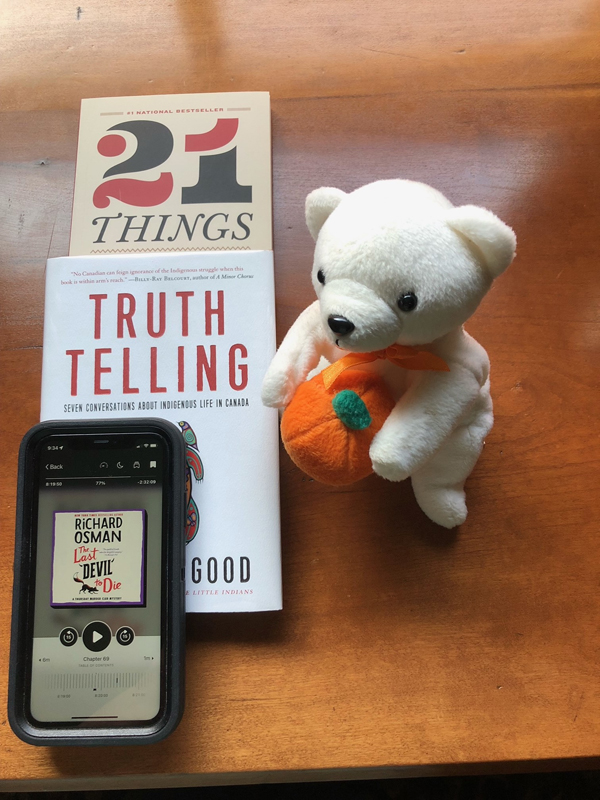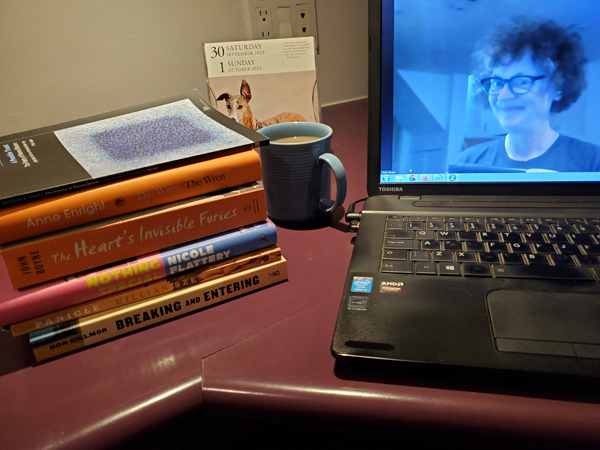On the verge of its sixth anniversary (yes!), our silent book club group does this amazing and wonderful thing more and more, with every meeting. One by one, as readers share updates on their recent reading, almost to a person, that recent reading includes a recommendation from another reader in the group. And that recommendation blossoms into other discoveries. And then the reader that offered that recommendation reveals that the previous reader inspired them with recommendations (backatcha!), and then that recommendation led down other intriguing paths, either deeper into a particular subject or an author’s body of work … and on and on it goes, around our virtual silent book club table. And it’s connected and enmeshed but, importantly, not spinning in on itself (meaning we’d all eventually be reading the same book, like, er, the kinds of book clubs we left to join this group …) It keeps spinning larger and larger concentric circles, drops on a pond that extend further and further out. It’s perpetually in motion in fascinating ways that has this reader looking forward to how it will all keep spinning when next we meet.
In addition to our monthly go-round (spinning!) meetings, we continue to devote a second meeting every month to a bookish topic of discussion. The topic of this month’s themed discussion meeting was:
Looking things up while you’re reading – If you encounter a reference or word or something you don’t recognize while you’re reading – and it’s not explained or discernible from the text – do you stop and look it up or do you keep going with the flow of what you’re reading?
While fairly evenly divided between stopping to look things up (even risking getting distracted by invariable online rabbit holes) and going with the flow, the assembled readers for this discussion learned a lot from those on one or the other side of this dilemma. Thoughts and revelations included:
- One reader who goes with the flow marks pages with scraps of paper that she circles back to later to look things up.
- The group debated whether or not cryptic words that one has to look up could or should be “solved” by the writer by either employing simpler prose or incorporating obvious clues, descriptions or explanations. In other words, should the text be self-contained and explanatory?
- Some readers confessed to being made to feel lazy if they just forged ahead and didn’t either stop at the time or look things up later. Others suggested a bit of mistrust of the author if things weren’t fully explained in context.
- Footnotes … ah, yes … the pros, the cons, even the quirky delights of …


Here is our group’s latest combined book list, gathering up books mentioned and discussed at our end of September 2023 meeting. Each list reflects the reading of many of our members. Many provide their reading lists even when they can’t attend a meeting. The titles featured in each of our reports encompass print and digital versions of books, along with audiobooks.
Any title on any of our group’s lists means that at least one (but usually more) readers have given that title some consideration. That’s encouragement for you and other readers checking out our reports and lists to consider it, too. Is that a recommendation? It might be, but not exactly or necessarily. Inclusion on this list always means that a title has been given thoughtful consideration and attention by our readers, which you can be assured counts for a lot.
- All the Things I Lost in the Flood by Laurie Anderson
- Masala Lab: The Science of Indian Cooking by Krish Ashok
- Hyperfocus: How to Be More Productive in a World of Distraction by Chris Bailey
- Ducks: Two Years in the Oil Sands by Kate Beaton
- The Age of Hope by David Bergen
- Firekeeper’s Daughter by Angeline Boulley
- The Heart’s Invisible Furies by John Boyne
- In Such Good Company: Eleven years of laughter, mayhem, and fun in the sandbox by Carol Burnett (audiobook)
- Milkman by Anna Burns
- My Early Life: 1874-1904 by Winston Churchill
- The Librarianist by Patrick de Witt
- The Lazy Tour of Two Idle Apprentices by Charles Dickens & Wilkie Collins
- Learned by Heart by Emma Donoghue
- Mindset: The New Psychology of Success by Carol S. Dwek, narrated by Bernadette Dunne (audiobook)
- The Wren, The Wren by Anne Enright
- A New Season by Terry Fallis
- Breaking and Entering by Don Gillmor
- Truth Telling: Seven Conversations About Indigenous Life in Canada by Michelle Good
- Passionate Mothers, Powerful Sons by Charlotte Gray
- Stranger Diaries by Elly Griffiths
- The House at Sea’s End by Elly Griffiths
- The Benevolent Society of Ill-Mannered Ladies by Alison Goodman
- The Making of Another Major Motion Picture Masterpiece by Tom Hanks, narrated by Tom Hanks, full cast (audiobook)
- Our Souls at Night by Kent Haruf
- Union Atlantic by Adam Haslett
- Sacred Time by Ursula Hegi
- The Five-Star Weekend by Elin Hilderbrand, narrated by Erin Bennett (audiobook)
- 21 Things You May Not Know About the Indian Act by Bob Joseph
- Demon Copperhead by Barbara Kingsolver
- Under the Whispering Door by TJ Klune
- Crow Lake by Mary Lawson, narrated by Amelia Sargisson (audiobook)
- The Road to Lichfield by Penelope Lively
- Judgment Day by Penelope Lively
- Bluebird, Bluebird by Attica Locke, narrated by JD Jackson (audiobook)
- What We Talk About When We Talk About Dumplings, edited by John Lorinc
- The Unlikely Thru-Hiker: An Appalachian Trail Journey by Derick Lugo
- Dopesick: Dealers, Doctors, and the Drug Company that Addicted America by Beth Macy
- Last Night in Montreal by Emily St. John Mandel, narrated by Alyssa Bresnahan (audiobook)
- On Writing and Failure by Stephen Marche
- Conversations with People Who Hate Me by Dylan Marron
- Pure Life by Eugene Marten
- Ghost Wall by Sarah Moss
- Hell of a Book: or the Altogether Factual, Wholly Bona Fide Story of a Big Dreams, Hard Luck, American-Made Mad Kid by Jason Mott, narrated by JD Jackson, Ronald Peet (audiobook)
- The Extraordinary Life of an Ordinary Man by Paul Newman, narrated by Paul Newman (previously taped) and 7 others (audiobook)
- The Angel Maker by Alex North
- True Biz by Sara Nović, narrated by Lisa Flanagan, Kaleo Griffith (audiobook) – here and here
- Hamnet by Maggie O’Farrell, narrated by Daisy Donovan (audiobook)
- Lagoon by Nnedi Okorafor
- The Last Devil to Die by Richard Osman
- The Godwulf Manuscript (Spenser #1) by Robert B. Parker
- Idgah by Munsi Premchand
- Gutter Child by Jael Ealey Richardson
- The Guncle by Steven Rowley
- Lily and the Octopus by Steven Rowley
- The Editor by Steve Rowley
- A Woman is No Man by Etaf Rum, narrated by Ariana Delawari, Dahlia Salem, Susan Nezami (audiobook)
- The Kaiju Preservation Society by John Scalzi
- I Used to Live Here Once by Miranda Seymour
- She and Her Cat: Stories by Makoto Shinkai
- Hollywood Unknowns by Anthony Slide
- Winter by Ali Smith, narrated by Melody Grove (audiobook)
- I Capture the Castle by Dodie Smith
- Just Mercy: A Story of Justice and Redemption by Bryan Stevenson (audiobook)
- The Sacrifice Box by Martin Stewart
- After the Rapture by Nancy Stohlman
- The Wave by Todd Strasser
- On The Plain Of Snakes: A Mexican Journey by Paul Theroux
- Blurb Your Enthusiasm: An A-Z of Literary Persuasion by Louise Willder
- Maisie Dobbs by Jacqueline Winspear, narrated by Rita Barrington (audiobook)
- Hello Sleep: The science and art of overcoming insomnia without medications by Jade Wu, narrated by Susannah Mars (audiobook)
- Reimagining Chinatown: An Anthology of Speculative Fiction, edited by Linda Zhang
Here are some extra book-related articles, resources, news and recommendations. These items and tidbits are often companions to books on the list, or are inspired or offered by our members and/or come up during our discussions and chat.
- Last month, I blended the poetry works I read for the 2023 Sealey Challenge (reading 31 works in 31 days) into our group’s combined reading list. I’ve since created a separate blog post of my Sealey Challenge reading here.
- “Something happened when we shifted to digital formats that created a loss of rights for readers. Pulling back the curtain on the evolution of ebooks offers some clarity to how the shift to digital left ownership behind in the analog world.” Read more in The Anti-Ownership Ebook Economy.
- Did we mention footnotes? Poet Ross Gay praises them!
- The reader who discussed the book Reimagining Chinatown: An Anthology of Speculative Fiction, edited by Linda Zhang at today’s meeting also recommended the documentary Big Fight in Little Chinatown as an interesting complement to the book.
- Another group member strongly recommends the Read the North Podcast. Season 1 is an engaging history of (mostly Toronto focused) CanLit.
Looking back almost six years,here’s a report from the very first meeting of the east end Toronto silent book club group.
You can always find our previous reports and book lists right here, growing every month.
You can also check out links to articles, interviews and more here – some with San Francisco-based Silent Book Club founders Guinevere de La Mare and Laura Gluhanich, and some with us here in east end Toronto.
Learn more about silent book clubs via Guinevere and Laura’s Silent Book Club web site. You can find information on meetings happening around the world and close to where you live. Every club is a different size, format (in-person, virtual or combinations) and vibe, so contact a club’s organizers beforehand if you have any questions or preferences. Please feel free to contact me for more information about our club and its offerings.
And if you explore some of the books here or on our other combined lists, our group will help you and your reading friends to keep that perpetual motion great reading machine rolling on and on and on …

The themed discussion in your group was about looking up unfamiliar references or words while reading. Could you share some insights into the diverse opinions within the group on whether to stop and look up such references or continue reading without interruption? Did any specific strategies or anecdotes stand out during this discussion?
I would say the group was pretty much evenly divided between those who would stop to look something up, and those who would forge ahead. The main “pro” of stopping to look something up was that you could proceed knowing what the unfamiliar term was and getting the full benefit, versus continuing to read with the nagging doubt that you were missing something important by not knowing the meaning of a term. The main “con” was that stopping to look something up often led a reader astray into other stuff online … !